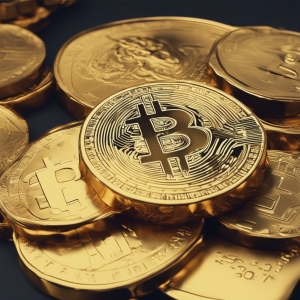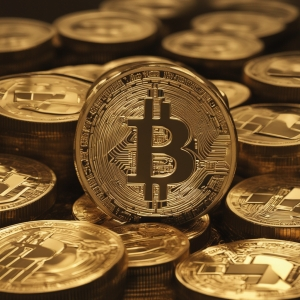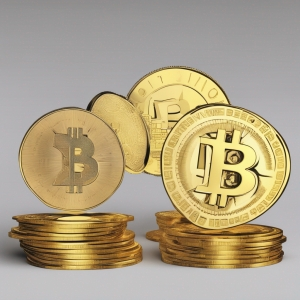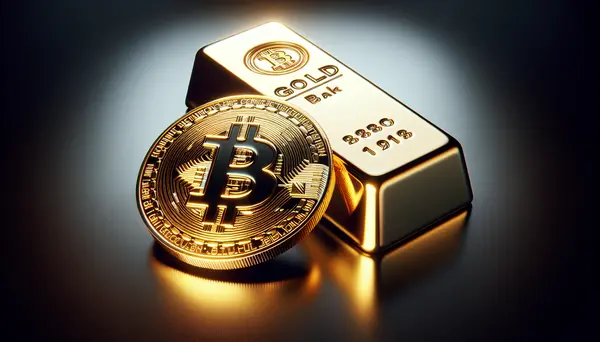Table of Contents:
Introduction to the Ultimate Investment Showdown
As a budding investor, you're faced with a daunting question - where should you place your hard-earned money? In today's volatile economic environment, many individuals are torn between two heavyweight investments, Bitcoin and gold. This article will demystify these investment options and highlight their pros and cons, helping you make a more informed decision.
While gold has been a reliable store of value for thousands of years, Bitcoin, a form of digital currency, has in the past decade emerged as a potential challenger. Known as the evolutionary "digital gold," Bitcoin promises to provide a solution to some of the traditional gold's limitations. However, Bitcoin is not without its uncertainties.
The Best Mining Providers at a Glance
» Infinity HashFrom our perspective, currently the best mining provider on the market. With the community concept, you participate in a mining pool completely managed by professionals. A portion of the earnings are used for expansion and maintenance. We've never seen this solved as cleanly anywhere else.
» Hashing24A well-known and established cloud hosting company. With a good entry point and in a good market phase, a good ROI can also be generated with some patience. Unfortunately, we see the durations as a major drawback.
Within this article, you'll find an easy-to-understand breakdown of these two investment options. This will equip you with a clearer understanding of their benefits and risks, paving your way to a more confident and strategic investment decision.
Understanding Bitcoin: A Brief Overview
At its core, Bitcoin is the world's pioneering decentralized cryptocurrency, invented in 2008. It drastically revolutionized the financial landscape by offering a unique alternative to traditional money. Constructed with complex cryptographic principles, Bitcoin is decentralized, digital, and finite. Its decentralization ensures no single entity has control over it, providing a level of freedom not observed in conventional banking systems.
Bitcoin transactions occur on a peer-to-peer basis without a need for intermediaries. This innovation means users can send or receive Bitcoins from any part of the globe, fostering global transactions and financial inclusivity. Also, the finite supply of Bitcoin – capped at 21 million – can potentially drive its value up over time, analogous to supply and demand dynamics.
However, Bitcoin’s journey is not all rosy; it has faced considerable criticism for its contribution to illicit activities and its extreme volatility. Unpredictable market fluctuations can result in substantial financial loss, making Bitcoin a risky investment option, especially for the faint-hearted.
Yet despite these hurdles, Bitcoin’s promise of high returns continues to attract investors worldwide, making it a fascinating – and potentially profitable – realm of the financial world.
Comparative Investment Analysis: Bitcoin vs Gold
| Criteria | Bitcoin | Gold |
|---|---|---|
| Liquidity | High | Medium |
| Volatility | High | Low to Medium |
| Storage and Maintenance | Low | High |
| Accessibility | 24/7 Trading | Limited Trading Hours |
| Inflation Protection | Yes | Yes |
| Growth Potential | High | Stable |
Exploring Gold: A Historically Valued Asset

Gold, advantaged by its millennia-long history, is often considered as a reliable form of wealth preservation and a fortress against inflation. Known for its inherent value and universal acceptance, gold has been a stable and consistent store of value.
One of the considerable attributes of gold is its lack of correlation with traditional asset classes, which tends to preserve its value through times of economic or geopolitical turmoil. It acts as a 'safe-haven' asset that investors tend to flock to during periods of financial market stress, thus having a protective edge against downside risk. Also, gold's limited supply, both in terms of mining prospects and above-ground stocks, can often drive its prices higher off the back of increased demand.
Despite its lauded stability, one must not neglect that gold does come with its setbacks. It does not generate a regular income unlike stocks or bonds, and the returns are reliant solely on price appreciation. The costs associated with storing and securing gold can also detract from its potential returns, undermining its profitability.
However, the allure of gold as an 'eternal store of value' suggests it will always have a significant role within the investor's portfolio, providing a trustworthy element of safety and diversification. Indeed, gold’s track record over the centuries provides a compelling case for it to be considered in any long-term investment strategy.
Investing in Bitcoin vs. Gold: Risk and Reward
Investments are always a game of risk versus reward and understanding this balance is key to making educated decisions. When it comes to Bitcoin and gold, each comes with its unique array of risks and potential rewards, and the best investment for you largely depends on your risk tolerance and financial goals.
Bitcoin, with its extreme volatility, presents both significant risks and substantial rewards. The price of Bitcoin can dramatically increase or decrease over a short period, which can result in major financial gains or losses. This characteristic of Bitcoin makes it a high-reward, high-risk investment. It's also important to note that despite being around for over a decade, Bitcoin is still in its early stage. This means that, in addition to its financial potential, investing in Bitcoin allows investors to be part of a groundbreaking financial revolution.
On the other hand, gold is often considered a safe haven asset due to its stability and resilience against market fluctuations. It may not provide the same potential for high returns as Bitcoin, but it offers a level of safety that is attractive to many investors. Unlike Bitcoin, gold has been tried and tested over centuries and its value tends not to change drastically. This makes gold a low-risk, low-reward investment, ideal for conservative investors or those looking to preserve rather than grow their wealth.
Remember, investing always comes with a certain degree of risk. What's important is making sure that the risk you're taking aligns with your financial goals and risk tolerance. Whether you choose to invest in Bitcoin or gold, a well-diversified portfolio can help you minimize risk and navigate the stormy seas of investing.
The Advantage of Liquidity: Bitcoin vs. Gold

Liquidity refers to the ease of converting an asset to cash without affecting its market price. It's an essential factor in investment decisions because it affects how quickly you can react to changes in the market.
When it comes to liquidity, Bitcoin generally comes out on top. Its digital nature means that you can buy or sell bitcoins at any time. The market operates 24/7 and offers various platforms for trading. Whether you need to cash out your investment quickly for an emergency, or spot a profitable trading opportunity, Bitcoin's liquidity presents a significant advantage.
However, it's crucial to remember that Bitcoin's market can be volatile. Rapid price fluctuations can pose challenges to converting your bitcoins to cash at your desired price. Also, certain exchanges may impose daily trading limits, potentially affecting large transactions.
On the other hand, gold's liquidity varies depending on its form. Physical gold, such as bars and coins, may not be as liquid as Bitcoin due to the additional steps involved in the sales process, like verifying its purity and finding a buyer. Selling physical gold also often incurs additional costs, such as dealer commissions and auction fees.
However, exchange-traded funds (ETFs) that track the price of gold offer more liquidity, as they can be bought or sold during market hours like any stock. So, while physical gold can be slightly harder to liquidate compared to Bitcoin, gold ETFs provide a viable alternative.
To conclude, while both Bitcoin and gold offer forms of liquidity, Bitcoin's 24/7 market and availability on numerous online platforms give it a slight edge. However, for those concerned with Bitcoin's volatility, gold ETFs could be a more suitable investment option.
Security Considerations for Bitcoin and Gold
When it comes to investing in any form, security is a pivotal concern. Both Bitcoin and gold have unique concerns regarding the security and the protection of your investment.
Bitcoin, being a digital asset, is susceptible to cyber risks such as hacking or phishing attacks. However, the security of Bitcoin ultimately lies with the owner. Effective management of private keys (similar to a password that grants access to your Bitcoins) can safeguard your assets from these cyber threats. Furthermore, advancements in hardware wallets have offered heightened security features. Despite these protections, the anonymous nature of Bitcoin transactions, once lost, is irretrievable, posing a daunting risk to your investment.
Gold, on the other hand, presents physical security concerns. Depending on the amount, storage can require a significant amount of space, as well as insurance to protect against theft or damage. There's also the hassle of moving it physically in large quantities which can be cumbersome and potentially dangerous. Despite these factors, gold has the distinctive advantage that the risk of total loss is virtually non-existent, unlike digital assets. If gold is stolen, with proper documentation, it is recoverable unlike Bitcoin. The security aspect, thus, can also play a crucial role while choosing your investment avenue.
Market Performance Comparison: Bitcoin vs. Gold

As we dive deeper into the Bitcoin versus gold discourse, a logical place to start is to compare their respective market performances. The past decade has seen Bitcoin rise from an unknown entity to a highly sought-after asset, producing astonishing returns for early investors.
Bitcoins price has skyrocketed from mere cents to tens of thousands of dollars - an increase that vastly outpaces most traditional asset classes, including gold. However, the cryptocurrency's volatile nature means it can also experience significant drops, sometimes in very short time frames. For instance, in 2018, Bitcoin's value plunged by nearly 80% - a stark reminder of the element of risk inherent to this investment.
On the flip side, gold has demonstrated fairly consistent performance. Over the past 50 years, the price of gold has increased approximately 8% per year on average. While these returns do not possess the shock and awe factor that Bitcoin's spikes might offer, they represent stable, predictable growth. Furthermore, during times of economic downturn or inflation, gold prices often rise as investors turn to reliable assets. This stabilization property makes gold a favored asset in diversified investment portfolios.
That said, historical performance is not a guarantee of future success. The price of Bitcoin and gold (likened to any other asset) can be influenced by various factors, including regulatory changes, economic events, and market sentiment. Therefore, thorough independent research and risk assessment constitute fundamental steps before stepping into either of these investment options.
Conclusion: Which is a Better Investment?
Deciding between Bitcoin and gold as an investment vehicle largely hinges on personal preferences and risk tolerance. Bitcoin, with its tremendous potential upside and extreme volatility, is most suited for those with a higher risk appetite and a willingness to navigate the digital wild west of cryptocurrencies.
Gold, with its proven stability and predictable behavioural pattern, tends to draw investors seeking a safe haven to shield their wealth from economic uncertainty. It's a choice that offers less potential for huge gains but provides more certainty and historically proven stability.
Neither Bitcoin nor gold represents a foolproof investment. Each comes with its risks, and their performances often hinge on diverse factors that can be incredibly hard to predict.
Therefore, as an investor, you should base your decision on an assessment of your investment goals, risk tolerance, and the time you're willing to invest in understanding and managing these assets. Also, considering these investment options not as mutually exclusive, but as complementary elements of a diversified portfolio, can optimize your investment strategy.
To wrap it up, always remember the age-old wisdom - 'Don't put all your eggs in one basket' - holds true for investing as well. Spreading your investments across a mix of asset classes, including both Bitcoin and gold, can vouch for a more balanced and resilient investment portfolio.
FAQ zum Thema Investition: Bitcoin vs. Gold
Was sind die Hauptunterschiede zwischen Bitcoin und Gold als Investition?
Gold ist ein physischer Vermögenswert, während Bitcoin eine digitale Währung ist. Bitcoin hat eine vorbestimmte Menge, während die Menge an Gold auf der Welt unbekannt ist. Der Preis von Bitcoin ist in der Regel volatiler als der von Gold.
Welche Investition ist risikoreicher, Bitcoin oder Gold?
Bitcoin gilt als die riskantere Investition aufgrund seiner Volatilität und des sich ständig ändernden Markts. Gold gilt hingegen als sicherer Hafen in turbulenten Zeiten.
Wie kann ich in Bitcoin und Gold investieren?
Um in Bitcoin zu investieren, brauchen Sie ein Konto auf einer Kryptowährungsbörse. Von dort können Sie Bitcoin kaufen und verkaufen. Gold kann entweder physisch in Form von Münzen und Barren oder über ETFs und Bergbauaktien gekauft werden.
Werden Bitcoin oder Gold in der Zukunft wertvoller sein?
Es ist unmöglich, festzustellen, welche Investition in der Zukunft wertvoller sein wird, da dies von vielen Faktoren abhängt, einschließlich Angebot und Nachfrage, Marktschwankungen und geopolitischen Ereignissen.
Welche Investition ist besser für einen langfristigen Anlagehorizont, Bitcoin oder Gold?
Beide Assets haben Vor- und Nachteile für langfristige Investoren. Bitcoin hat das Potenzial für hohe Erträge, birgt jedoch auch ein hohes Risiko. Gold hingegen ist bewährt und stabil, bietet jedoch möglicherweise nicht die gleiche Wachstumsrate wie Bitcoin.









